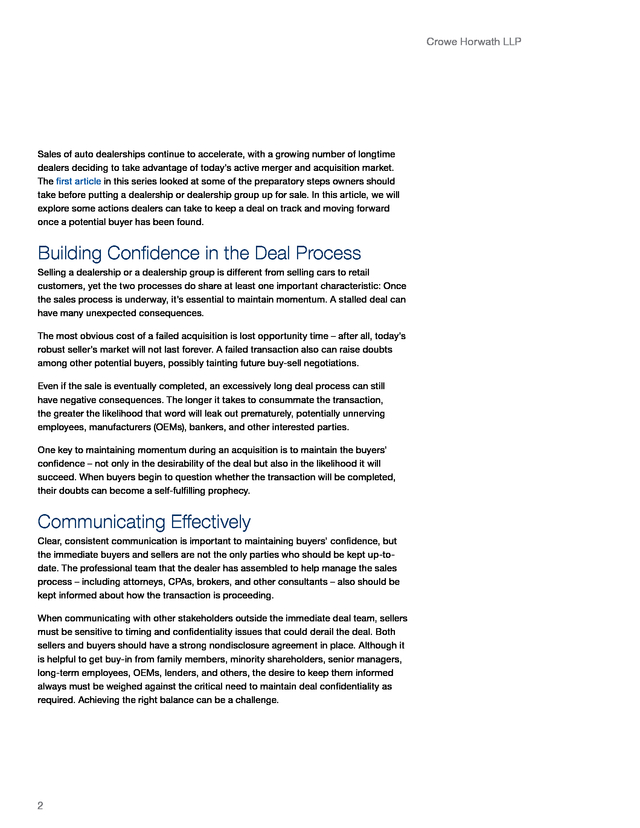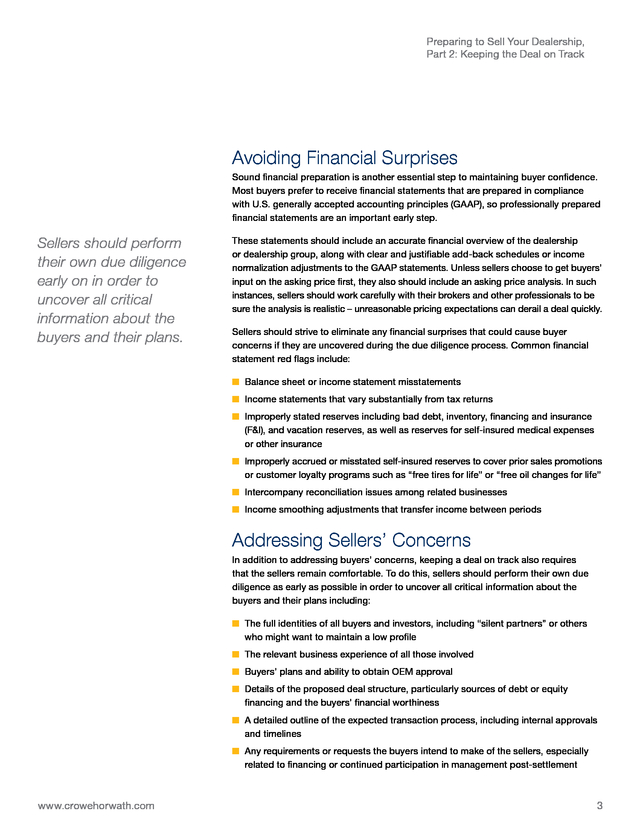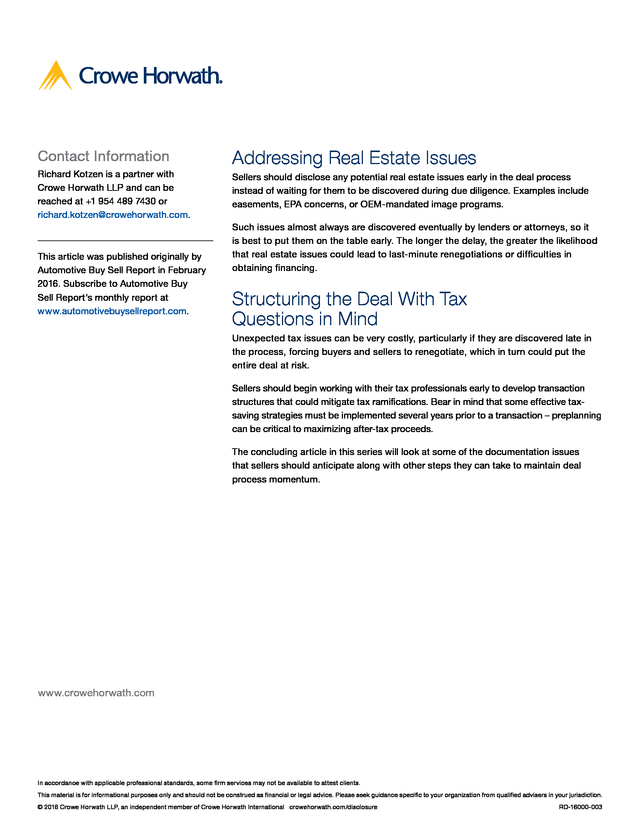Description
March 2016
Preparing to Sell Your Dealership, Part 2
Keeping the Deal on Track
By Richard H. Kotzen, CPA
Audit | Tax | Advisory | Risk | Performance
. Crowe Horwath LLP
Sales of auto dealerships continue to accelerate, with a growing number of longtime
dealers deciding to take advantage of today’s active merger and acquisition market.
The first article in this series looked at some of the preparatory steps owners should
take before putting a dealership or dealership group up for sale. In this article, we will
explore some actions dealers can take to keep a deal on track and moving forward
once a potential buyer has been found.
Building Confidence in the Deal Process
Selling a dealership or a dealership group is different from selling cars to retail
customers, yet the two processes do share at least one important characteristic: Once
the sales process is underway, it’s essential to maintain momentum. A stalled deal can
have many unexpected consequences.
The most obvious cost of a failed acquisition is lost opportunity time – after all, today’s
robust seller’s market will not last forever. A failed transaction also can raise doubts
among other potential buyers, possibly tainting future buy-sell negotiations.
Even if the sale is eventually completed, an excessively long deal process can still
have negative consequences.
The longer it takes to consummate the transaction, the greater the likelihood that word will leak out prematurely, potentially unnerving employees, manufacturers (OEMs), bankers, and other interested parties. One key to maintaining momentum during an acquisition is to maintain the buyers’ confidence – not only in the desirability of the deal but also in the likelihood it will succeed. When buyers begin to question whether the transaction will be completed, their doubts can become a self-fulfilling prophecy. Communicating Effectively Clear, consistent communication is important to maintaining buyers’ confidence, but the immediate buyers and sellers are not the only parties who should be kept up-todate. The professional team that the dealer has assembled to help manage the sales process – including attorneys, CPAs, brokers, and other consultants – also should be kept informed about how the transaction is proceeding. When communicating with other stakeholders outside the immediate deal team, sellers must be sensitive to timing and confidentiality issues that could derail the deal.
Both sellers and buyers should have a strong nondisclosure agreement in place. Although it is helpful to get buy-in from family members, minority shareholders, senior managers, long-term employees, OEMs, lenders, and others, the desire to keep them informed always must be weighed against the critical need to maintain deal confidentiality as required. Achieving the right balance can be a challenge. 2 .
Preparing to Sell Your Dealership, Part 2: Keeping the Deal on Track Avoiding Financial Surprises Sound financial preparation is another essential step to maintaining buyer confidence. Most buyers prefer to receive financial statements that are prepared in compliance with U.S. generally accepted accounting principles (GAAP), so professionally prepared financial statements are an important early step. Sellers should perform their own due diligence early on in order to uncover all critical information about the buyers and their plans. These statements should include an accurate financial overview of the dealership or dealership group, along with clear and justifiable add-back schedules or income normalization adjustments to the GAAP statements. Unless sellers choose to get buyers’ input on the asking price first, they also should include an asking price analysis. In such instances, sellers should work carefully with their brokers and other professionals to be sure the analysis is realistic – unreasonable pricing expectations can derail a deal quickly. Sellers should strive to eliminate any financial surprises that could cause buyer concerns if they are uncovered during the due diligence process.
Common financial statement red flags include: â– â– Balance sheet or income statement misstatements â– â– Income statements that vary substantially from tax returns â– â– Improperly stated reserves including bad debt, inventory, financing and insurance (F&l), and vacation reserves, as well as reserves for self-insured medical expenses or other insurance â– â– Improperly accrued or misstated self-insured reserves to cover prior sales promotions or customer loyalty programs such as “free tires for life” or “free oil changes for life” â– â– Intercompany reconciliation issues among related businesses â– â– Income smoothing adjustments that transfer income between periods Addressing Sellers’ Concerns In addition to addressing buyers’ concerns, keeping a deal on track also requires that the sellers remain comfortable. To do this, sellers should perform their own due diligence as early as possible in order to uncover all critical information about the buyers and their plans including: â– â– The full identities of all buyers and investors, including “silent partners” or others who might want to maintain a low profile â– â– The relevant business experience of all those involved â– â– Buyers’ plans and ability to obtain OEM approval â– â– Details of the proposed deal structure, particularly sources of debt or equity financing and the buyers’ financial worthiness â– â– A detailed outline of the expected transaction process, including internal approvals and timelines â– â– Any requirements or requests the buyers intend to make of the sellers, especially related to financing or continued participation in management post-settlement www.crowehorwath.com 3 . Contact Information Addressing Real Estate Issues Richard Kotzen is a partner with Crowe Horwath LLP and can be reached at +1 954 489 7430 or richard.kotzen@crowehorwath.com. Sellers should disclose any potential real estate issues early in the deal process instead of waiting for them to be discovered during due diligence. Examples include easements, EPA concerns, or OEM-mandated image programs. This article was published originally by Automotive Buy Sell Report in February 2016. Subscribe to Automotive Buy Sell Report’s monthly report at www.automotivebuysellreport.com. Such issues almost always are discovered eventually by lenders or attorneys, so it is best to put them on the table early. The longer the delay, the greater the likelihood that real estate issues could lead to last-minute renegotiations or difficulties in obtaining financing. Structuring the Deal With Tax Questions in Mind Unexpected tax issues can be very costly, particularly if they are discovered late in the process, forcing buyers and sellers to renegotiate, which in turn could put the entire deal at risk. Sellers should begin working with their tax professionals early to develop transaction structures that could mitigate tax ramifications.
Bear in mind that some effective taxsaving strategies must be implemented several years prior to a transaction – preplanning can be critical to maximizing after-tax proceeds. The concluding article in this series will look at some of the documentation issues that sellers should anticipate along with other steps they can take to maintain deal process momentum. www.crowehorwath.com In accordance with applicable professional standards, some firm services may not be available to attest clients. This material is for informational purposes only and should not be construed as financial or legal advice. Please seek guidance specific to your organization from qualified advisers in your jurisdiction. © 2016 Crowe Horwath LLP, an independent member of Crowe Horwath International crowehorwath.com/disclosure RD-16000-003 .
The longer it takes to consummate the transaction, the greater the likelihood that word will leak out prematurely, potentially unnerving employees, manufacturers (OEMs), bankers, and other interested parties. One key to maintaining momentum during an acquisition is to maintain the buyers’ confidence – not only in the desirability of the deal but also in the likelihood it will succeed. When buyers begin to question whether the transaction will be completed, their doubts can become a self-fulfilling prophecy. Communicating Effectively Clear, consistent communication is important to maintaining buyers’ confidence, but the immediate buyers and sellers are not the only parties who should be kept up-todate. The professional team that the dealer has assembled to help manage the sales process – including attorneys, CPAs, brokers, and other consultants – also should be kept informed about how the transaction is proceeding. When communicating with other stakeholders outside the immediate deal team, sellers must be sensitive to timing and confidentiality issues that could derail the deal.
Both sellers and buyers should have a strong nondisclosure agreement in place. Although it is helpful to get buy-in from family members, minority shareholders, senior managers, long-term employees, OEMs, lenders, and others, the desire to keep them informed always must be weighed against the critical need to maintain deal confidentiality as required. Achieving the right balance can be a challenge. 2 .
Preparing to Sell Your Dealership, Part 2: Keeping the Deal on Track Avoiding Financial Surprises Sound financial preparation is another essential step to maintaining buyer confidence. Most buyers prefer to receive financial statements that are prepared in compliance with U.S. generally accepted accounting principles (GAAP), so professionally prepared financial statements are an important early step. Sellers should perform their own due diligence early on in order to uncover all critical information about the buyers and their plans. These statements should include an accurate financial overview of the dealership or dealership group, along with clear and justifiable add-back schedules or income normalization adjustments to the GAAP statements. Unless sellers choose to get buyers’ input on the asking price first, they also should include an asking price analysis. In such instances, sellers should work carefully with their brokers and other professionals to be sure the analysis is realistic – unreasonable pricing expectations can derail a deal quickly. Sellers should strive to eliminate any financial surprises that could cause buyer concerns if they are uncovered during the due diligence process.
Common financial statement red flags include: â– â– Balance sheet or income statement misstatements â– â– Income statements that vary substantially from tax returns â– â– Improperly stated reserves including bad debt, inventory, financing and insurance (F&l), and vacation reserves, as well as reserves for self-insured medical expenses or other insurance â– â– Improperly accrued or misstated self-insured reserves to cover prior sales promotions or customer loyalty programs such as “free tires for life” or “free oil changes for life” â– â– Intercompany reconciliation issues among related businesses â– â– Income smoothing adjustments that transfer income between periods Addressing Sellers’ Concerns In addition to addressing buyers’ concerns, keeping a deal on track also requires that the sellers remain comfortable. To do this, sellers should perform their own due diligence as early as possible in order to uncover all critical information about the buyers and their plans including: â– â– The full identities of all buyers and investors, including “silent partners” or others who might want to maintain a low profile â– â– The relevant business experience of all those involved â– â– Buyers’ plans and ability to obtain OEM approval â– â– Details of the proposed deal structure, particularly sources of debt or equity financing and the buyers’ financial worthiness â– â– A detailed outline of the expected transaction process, including internal approvals and timelines â– â– Any requirements or requests the buyers intend to make of the sellers, especially related to financing or continued participation in management post-settlement www.crowehorwath.com 3 . Contact Information Addressing Real Estate Issues Richard Kotzen is a partner with Crowe Horwath LLP and can be reached at +1 954 489 7430 or richard.kotzen@crowehorwath.com. Sellers should disclose any potential real estate issues early in the deal process instead of waiting for them to be discovered during due diligence. Examples include easements, EPA concerns, or OEM-mandated image programs. This article was published originally by Automotive Buy Sell Report in February 2016. Subscribe to Automotive Buy Sell Report’s monthly report at www.automotivebuysellreport.com. Such issues almost always are discovered eventually by lenders or attorneys, so it is best to put them on the table early. The longer the delay, the greater the likelihood that real estate issues could lead to last-minute renegotiations or difficulties in obtaining financing. Structuring the Deal With Tax Questions in Mind Unexpected tax issues can be very costly, particularly if they are discovered late in the process, forcing buyers and sellers to renegotiate, which in turn could put the entire deal at risk. Sellers should begin working with their tax professionals early to develop transaction structures that could mitigate tax ramifications.
Bear in mind that some effective taxsaving strategies must be implemented several years prior to a transaction – preplanning can be critical to maximizing after-tax proceeds. The concluding article in this series will look at some of the documentation issues that sellers should anticipate along with other steps they can take to maintain deal process momentum. www.crowehorwath.com In accordance with applicable professional standards, some firm services may not be available to attest clients. This material is for informational purposes only and should not be construed as financial or legal advice. Please seek guidance specific to your organization from qualified advisers in your jurisdiction. © 2016 Crowe Horwath LLP, an independent member of Crowe Horwath International crowehorwath.com/disclosure RD-16000-003 .

















